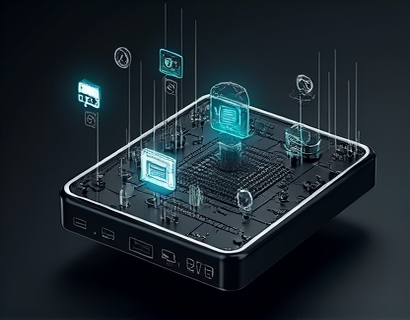AI-Driven Personalized Healthcare: Revolutionizing Access to Expert Insights and Reliable Information
In the rapidly evolving landscape of healthcare, the integration of artificial intelligence (AI) is transforming the way individuals access and utilize medical information. An AI-driven platform stands at the forefront of this revolution, offering users instant personalized medical insights and expert advice. This technology not only empowers individuals to make informed health decisions but also enhances overall well-being through advanced technology and timely support. The purpose of this article is to delve into the transformative impact of AI in personalized healthcare, exploring how it is reshaping the way we interact with medical information and expert advice.
The Need for Personalized Healthcare
Traditional healthcare models often struggle to provide personalized attention due to the sheer volume of patients and the complexity of individual health needs. This has led to a one-size-fits-all approach that may not always be effective. The introduction of AI-driven personalized healthcare addresses this gap by leveraging vast amounts of data to tailor medical advice and insights to each user's unique situation. This personalized approach ensures that the information and advice provided are relevant, accurate, and actionable.
How AI-Driven Platforms Work
AI-driven healthcare platforms utilize a combination of machine learning algorithms, natural language processing, and data analytics to deliver personalized insights. When a user interacts with the platform, it collects relevant data such as medical history, current symptoms, and lifestyle factors. This data is then processed through sophisticated algorithms that analyze patterns and correlations to generate tailored recommendations. The platform can also integrate with wearable devices and electronic health records to gather real-time data, ensuring the advice is up-to-date and contextually relevant.
Instant Access to Expert Insights
One of the most significant advantages of AI-driven personalized healthcare is the ability to access expert insights instantly. In the past, consulting with a medical expert often involved lengthy wait times and high costs. With an AI platform, users can receive immediate responses to their health queries, mimicking the convenience of a personal consultation. This instant access to expert advice can be particularly valuable in urgent situations or for ongoing health management, providing peace of mind and prompt guidance when needed.
Reliable and Accurate Information
The reliability of medical information is crucial for making informed health decisions. AI-driven platforms ensure that the information provided is based on the latest research and clinical guidelines. By continuously updating its databases and algorithms, the platform maintains a high standard of accuracy. Users can trust the advice they receive, knowing it is grounded in evidence-based medicine. This reliability is especially important for individuals managing chronic conditions or seeking advice on complex health issues.
Enhancing User Engagement and Education
AI-driven healthcare platforms are not just about providing information; they are designed to engage users and educate them about their health. Through interactive features and personalized content, users can gain a deeper understanding of their conditions and the options available to them. Educational resources, such as articles, videos, and interactive tools, are tailored to the user's level of knowledge and specific health concerns. This educational component empowers users to take an active role in their healthcare, fostering a more collaborative relationship with healthcare providers.
Personalized Treatment Plans and Monitoring
Beyond providing advice, AI-driven platforms can assist in creating and monitoring personalized treatment plans. By analyzing user data and input, the platform can suggest tailored treatment options and track progress over time. This continuous monitoring helps in adjusting the treatment plan as needed, ensuring that the user receives the most effective care. For conditions that require ongoing management, this feature is invaluable, providing a structured and supportive approach to health maintenance.
Addressing Mental Health Needs
Mental health is a critical aspect of overall well-being, and AI-driven platforms can play a significant role in addressing these needs. By offering personalized mental health resources and support, these platforms help users manage stress, anxiety, and depression. Features such as mood tracking, mindfulness exercises, and access to mental health professionals can be integrated to provide comprehensive support. This holistic approach ensures that users receive the care they need for both physical and mental health.
Building Trust Through Transparency
Trust is a fundamental component of any healthcare solution. AI-driven platforms prioritize transparency to build and maintain user trust. Clear explanations of how recommendations are generated, along with the sources of information, help users understand the basis of the advice they receive. Additionally, users have control over their data, with options to manage privacy settings and opt-out of data sharing. This transparency and control are essential in fostering a trusting relationship between the user and the platform.
Challenges and Considerations
While AI-driven personalized healthcare offers numerous benefits, it is not without challenges. Ensuring the accuracy and reliability of AI algorithms is paramount, requiring rigorous testing and continuous improvement. Privacy and data security are also critical concerns, as sensitive health information must be protected. Compliance with healthcare regulations and standards is essential to maintain user trust and legal integrity. Addressing these challenges through robust design and governance frameworks is crucial for the success of AI-driven healthcare solutions.
Future Prospects and Innovations
The future of AI-driven personalized healthcare is promising, with ongoing advancements in technology and data science. Integration with emerging technologies such as blockchain for secure data management, augmented reality for immersive educational experiences, and advanced genomics for more precise personalized medicine are on the horizon. These innovations will further enhance the capabilities of AI-driven platforms, making them even more effective and user-friendly. As the technology continues to evolve, the potential to transform healthcare delivery and patient outcomes remains vast.
Conclusion
AI-driven personalized healthcare represents a significant leap forward in how we access and utilize medical information. By providing instant expert insights and reliable data, these platforms empower individuals to make informed health decisions and enhance their well-being. The integration of advanced technology with healthcare not only improves the efficiency and effectiveness of medical advice but also fosters a more engaged and educated user base. As the healthcare landscape continues to evolve, AI-driven solutions will play an increasingly vital role in shaping the future of personalized medicine.










































